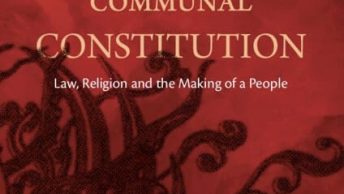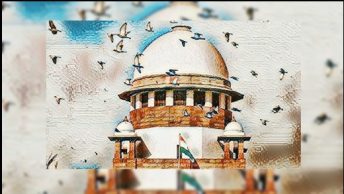As part of our New Scholarship Section on our Blog, we have been inviting discussants to respond to specific articles. The authors will also respond to these pieces if they choose to. The earlier series can be found here and here. Our third part of discussions under the New Scholarship series around public law themed articles will include pieces featured in the recently released Issue 2 of the 2020 Volume of the Indian Law Review. This post will link all the responses to the Articles from this Issue of ILR.
I. The first piece that we have under discussion is from Deirdre N. Dlugoleski.Ms.Dlugoleski joined EarthRights as a Bertha Fellow in September 2020. Before joining EarthRights, Ms.Deirdre was a legal fellow at Robert F. Kennedy Human Rights, where she worked on strategic litigation before the Inter-American Commission and Inter-American Court of Human Rights. Her research article is titled “Undoing historical injustice: the role of the Forest Rights Act and the Supreme Court in departing from colonial forest laws”, which is available at https://doi.org/10.1080/
The abstract states- “In terms of land tenure security, forest dwellers in India, who own and manage less than 3% of forested land nationwide, are among the worst off in the world. Vulnerable to forced eviction at any point, they stand at risk of losing their homes and means of survival with little legal redress. The Forest Rights Act of 2006, an attempt to increase their security, recognizes both individual and community land claims and mandates a uniform process for granting legal title. Greater recognition of forest rights, however, implicates the interests of powerful extractive industries also seeking control over forest land. In the Niyamgiri case, the Indian Supreme Court defended an indigenous claim against a multinational corporation by tying cultural rights to land. This reasoning pushed Indian jurisprudence closer to developing international law on indigenous land rights, particularly that of the Interamerican system, which can offer guidance for building on this precedent.”
- Ms Dlugoleski discusses her research Article here.
-
In his response piece, C.R. Bijoy stresses upon the importance of being familiar with the context when deciphering laws and court orders. He highlights some of the important ground realities of forest governance in India, and gives specific instances wherein the role of the Supreme Court and the Ministry of Environment, Forests and Climate Change need to be scrutinised. In doing so, he attempts to contextualise the arguments raised in Dlugoleski’s research article. You can find the response here.
- In her response piece, Shalini Iyengar focuses on some key questions and areas for future enquiry that emerge from Ms. Dlugoleski’s Paper. She highlights the linkages between public protests and environment law-making made by the Paper, and questions the role of religion and ethics in Indian environmental and human rights law. She also considers the scope of the Supreme Court’s effort to “read in” international human rights law in the Niyamgiri case. You can find the response here.
- Ms. Dlugoleski gives a detailed response to the discussions by Mr. Bijoy and Ms. Iyengar here.
II. Zaid Deva is an LLM Candidate & Felix Scholar, SOAS University of London. He has completed his undergraduate studies from Gujarat National Law University, Gandhinagar. In his research article titled “Basic without Structure?: the Presidential Order of 1954 and the Indo-Jammu & Kashmir Constitutional Relationship”, he argues that the autonomous status of J&K inheres in the State by virtue of the fact that J&K CA designed the State’s constitutional relationship with the Union. He looks at the role of the 1954 Order in this constitutional relationship by relying on the CA debates (which interestingly treat it as part of the state’s constitution) and argues why it could not have been superseded by following the processes of Article 370. The research article is available at https://doi.org/10.1080/24730580.2020.1791520.
The abstract of the article reads as follows:
“In August 2019, India revoked unilaterally the autonomous position of the State of Jammu & Kashmir. This came in the backdrop of multiple petitions before its Supreme Court challenging this autonomous status, particularly Article 35A of the Presidential Order of 1954 (Basic Order) on the ground that its “incorporation” in the “Indian Constitution” amounted to an “amendment” and the same was unconstitutional for violating the basic structure. The Indian union’s decision to supersede the Basic Order by employing the mechanism of Article 370 and the constitutional challenge against Article 35A raise a deeper question on the nature of J&K’s accession to India, the resultant Indo-J&K constitutional relationship, and the place of the Basic Order in the constitutional scheme. Without first situating the Basic Order in the constitutional scheme, the question of basic structure violation by Article 35A and the (un)constitutionality of the August decision cannot be fully appreciated.”
- Mr. Zaid Deva introduces his article here.
- In his response piece, Muhammad Mutahhar Amin stresses upon the importance that this paper makes possible a radical re-imagination of the constitutional relationship between India and Kashmir, which puts a new light on the scope and nature of the actions taken place as part of the abrogation of Article 370. In doing so, he attempts to revisit and contextualise the arguments raised in Zaid’s article. You can find the response here.
III. Farrah Ahmed is a Professor at Melbourne Law School, University of Melbourne. Her research spans public law, legal theory and family law. She is also a founding editor of the Indian Law Review and the Admin Law Blog. In her article titled “Arbitrariness, Subordination and Unequal Citizenship”, she discusses the Citizenship Amendment Act 2019 in light of two inadequately appreciated constitutional principles: the anti-subordination principle, and the anti-arbitrariness principle. The article is available at: https://doi.org/10.1080/24730580.2020.1761142.
The abstract of the article reads as follows:
“The equality provisions of the Indian Constitution proscribe legislation that is arbitrary and, this paper argues, legislation that subordinates. The tests for arbitrariness and subordination are currently unclear. This paper articulates a test for arbitrariness, making sense of the doctrine of manifest arbitrariness under Article 14, using philosophical literature on arbitrary decision-making. The paper similarly articulates a test for the anti-subordination principle inherent in the equality provisions of the Constitution. The paper then demonstrates how the Citizenship (Amendment) Act 2019 is unconstitutional when measured against these tests. The paper demonstrates why, contrary to common assumption, the Act implicates Article 15, as well as Article 14, of the Constitution.”
1. Dr. Ahmed introduces her article here.2.
2. In her response piece, Apurva Thakur expands upon the Anti-Arbitrariness Principle mentioned in the article, by focusing upon the elementary tests of rational nexus and reasonable classification. Furthermore, she explains why the reverse burden of proof argument might be premature, in light of the tests under international law. She supplements the article by going analysing CAA 2019 against the anvil of Basic Structure Test and Constitutional Morality. You can find the response piece here.
IV. Preeti Pratishruti Dash is Research Associate at Project 39A, National Law University, Delhi. She completed her bachelors in law from National Law University, Odisha, and pursued LLM from Harvard Law School. Previously, she was also the Research Associate at Centre of Death Penalty, National Law University, Delhi. In her article titled “Rape adjudication in India in the aftermath of Criminal Law Amendment Act, 2013: Findings from trial courts of Delhi”, she assesses the imapct of Criminal Law Amendment, 2013 (CLA- 2013) on rape adjutication. The article is available at: https://doi.org/10.1080/24730580.2020.1768774.
The abstract of the article reads as follows:
“This paper asesses the impact of the Criminal Law Amendment Act, 2013 (CLA-2013) on rape adjudication, by examining 1635 rape judgments from trial courts of Delhi pronounced between 2013 and 2018. Of these, 726 cases were adjudicated under the old law, of which 16.11% resulted in convictions and 909 cases were adjudicated under the CLA-2013, of which 5.72% resulted in convictions. Analysing this data, the paper argues that absence of engagement with criminal justice literature linking mandatory minimum punishments with higher acquittal rates, led to unintended consequences, like reduced convictions under the CLA-2013. The paper also finds similar patterns between nature of rapes and reasons for acquittal under both laws, highlighting that mere legal reform, unaccompanied by governance and social reform, does not yield far-reaching results. The paper concludes by questioning the use of criminal law as a site for feminist reform.”
1. Preeti introduces her article here.
2. Saptarshi Mandal’s response can be found here
3. In her response piece, Shruti Iyer writes about how Dash’s article provides an apt opportunity for feminists to reflect on the outcome of their efforts. She also makes observations about the status of civil society engagement in policymaking.
4. Preeti’s response to Saptarshi Mandal and Shruti Iyer can be found here.






I stumbled across https://arxua.com/ when I was scrolling through a thread on a tech forum about fast-loading casino sites. What made me stay was the clean layout and how responsive it felt, especially compared to other cluttered pages. It’s rare to see such a balance between usability and content, and I found myself actually enjoying browsing through their gaming sections without lag or confusion.
Thanks for sharing. I read many of your blog posts, cool, your blog is very good.